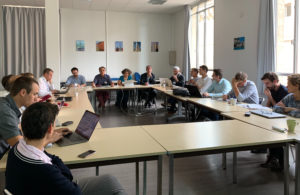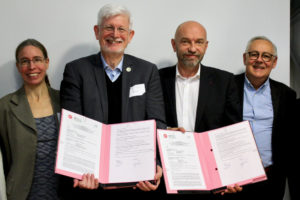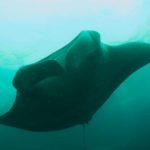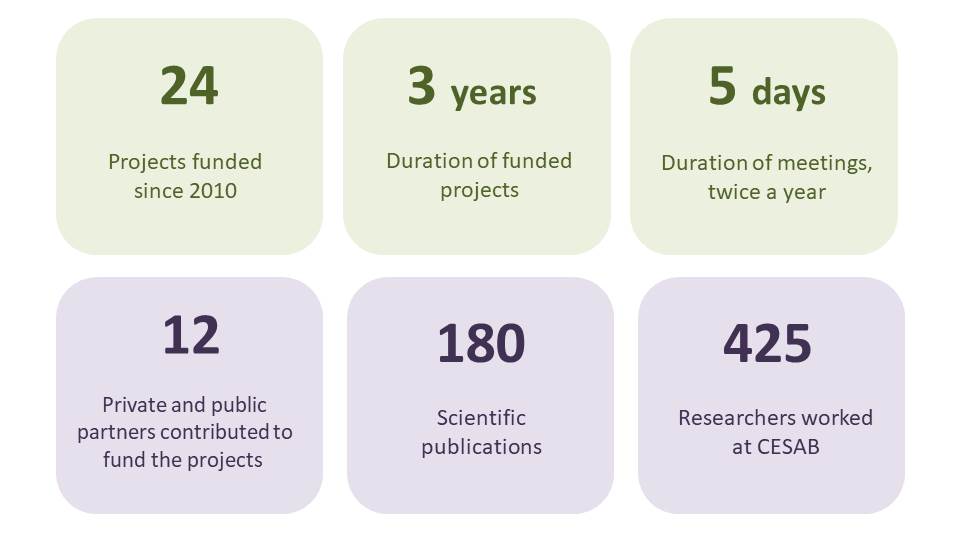[FRB-CESAB] Newsletter 2 CESAB – January 2020
The FRB’s Center for Biodiversity Synthesis and Analysis (CESAB) is a research structure with an international scope whose objective is to implement innovative work on the synthesis and analysis of existing data sets in the field of biodiversity. Twice a year, the CESAB publishes a newsletter listing the different news and activities going on.
![[FRB-CESAB] Newsletter 2 CESAB – January 2020](https://www.fondationbiodiversite.fr/wp-content/uploads/2020/01/nicolas1.jpg) © Andrew Helmstetter
© Andrew Helmstetter
2020 will be the year of biodiversity! The biodiversity crisis has become central in the international agenda after the publication by the IPBES of the Global Assessment Report on Biodiversity and Ecosystem Services in 2019. 2020 will see major events with the IUCN world conservation congress to be held in Marseille in June and the COP15 Biodiversity in Kunming, among many others.
Biodiversity synthesis centres have fueled this dynamic by promoting the scientiflc synthesis on biodiversity and helping researchers to adapt to the exponential increase in available data and to the globalization of scientiflc ecology. We can be proud of what have been achieved but are also concerned about what still need to be done and how we will contribute to assess the knowledge gaps on biodiversity.
2019 have been a year of transition for the CESAB, we have moved to Montpellier and have created a new ecosystem, integrating many new partners, and experiencing new tools to promote biodiversity synthesis. We have launched joint calls with other synthesis centers (German sDiv, Canadian CIEE) and French scientiflc actors (AFB, Labex Cemeb), have organized a training course for young scientists on reproductibility in ecological data science and held an international conference on large scale conservation in Montpellier. This has been possible thanks to the help of the incredible FRB team dedicated to CESAB and more generally of the FRB, and to the dynamism of our many ongoing working groups.
2020 will be the year we consolidate this ecosystem, open new ambitious calls for synthesis groups and amplify the momentum. We now have the trust and support from our founding members and partners and are trying to work together to make CESAB contribute even more to the biodiversity synthesis!
Best wishes for this new year.
Nicolas Mouquet

The Canadian Institute of Ecology and Evolution (CIEE) and the Centre for the Synthesis and Analysis of Biodiversity (CESAB) of the FRB offer a joint call for working groups that include researchers based primarily in Canada and France, on the topic “Biodiversity in a time of Global Change”.
Proposal deadline: 31st January 2020

The CeMEB LabEx (Mediterranean Environment and Biodiversity Centre) and the Centre for the Synthesis and Analysis of Biodiversity (CESAB) of the FRB offer financial support for hosting 2 foreign researchers for short stays at the CESAB in Montpellier (from 2 months minimum to 3 months maximum).
- Deep learning for poverty prediction from staellite images
Location: FRB-CESAB – 5, rue de l’École de Médecine, 34000 MONTPELLIER
Deadlines : 15th February 2020
Starting date : May 2020
Find more information on our postdoctoral offers here.
- 4th October 2019, Montpellier – FAIR Data

CESAB hosted an inter-Labex reflection day on the growing need to make research data FAIR: “Findable, Accessible, Interoperable and Reusable”.
- 29th November 2019 , Montpellier – CESAB presentation

The founding members of the FRB as well as local partners were invited to CESAB for a presentation of our new premises and actions. A partnership convention was signed between the FRB-CESAB and the University of Montpellier during this occasion.
- 29th November 2019, Montpellier – International conference Challenges and Perspectives in Large Scale Conservation

Scientiflc conference of the working group PELAGIC, organized with the ZSL (Zoological Society of London) and the Fondation Bertarelli. Presentations are available online.
- 2-6 December 2019, Montpellier – First Cesab training course : Data toolbox for reproducible research in computational ecology

17 students, engineers and researchers from all over France came to attend this training at CESAB’s premises in Montpellier. The course was co-organized with GDR EcoStat. Building on this success, a second edition will be organised in 2020. More information here.
Hedde M, Nahmani J, Séré G, Auclerc A & Cortet J (2019) Early colonisation of constructed technosols by macro-invertebrates. Journal of Soil and Sediments, 19, 3193–3203. doi: 10.1007/s11368-018-2142-9.
Catarino R, Gaba S & Bretagnolle V (2019) Experimental and empirical evidence shows that reducing weed control in winter cereal fields is a viable strategy for farmers. Scientific Reports, 9, 9004. doi: 10.1038/s41598-019-45315-8.
Mahaut L, Gaba S & Fried G (2019) A functional diversity approach of crop sequences reveals that weed diversity and abundance show different responses to environmental variability. Journal of Applied Ecology, 56, 1400–1409. doi: 10.1111/1365-2664.13389.
Metcalfe H, Hassall KL, Boinot S & Storkey J (2019) The contribution of spatial mass effects to plant diversity in arable fields. Journal of Applied Ecology, 56, 1560–1574. doi: 10.1111/1365-2664.13414.
Marino NAC, Céréghino R, Gilbert B, Petermann J, Srivastava DS, de Omena PM, Ospina Bautista F, Farjalla VF, Guzman LM, Romero GQ, Trzcinski MK, Barberis IM, Corbara B, Debastiani VJ, Dézerald O, Kratina K, Leroy C, MacDonald AAM, Montero G, Pillar VD, Richardson BA, Richardson MJ, Talaga S, Gonçalves AZ, Piccoli GCO & Jocqué M (2019) Species niches, not traits, determine abundance and occupancy patterns: A multi-site synthesis. Global Ecology and Biogeography, accepted. doi: 10.1111/geb.13029.
Pellissier V, Schmucki R, Pe’er G, Aunins A, Brereton TM, Brotons L, Carnicer J, Chodkiewicz T, Chylarecki P, del Moral JC, Escandell V, Evans D, Foppen R, Harpke A, Heliölä J, Herrando S, Kuussaari M, Kühn E, Lehikoinen A, Lindström A, Moshoj CM, Musche M, Noble D, Oliver TH, Reif J, Richard D, Roy DB, Schweiger O, Settele J, Stefanescu C, Teufelbauer N, Touroult J, Trautmann S, van Strien AJ, Swaay CAM, Turnhout C, Vermouzek Z, Vorísek P, Jiguet F & Julliard R (2019) Effects of Natura 2000 on nontarget bird and butterfly species based on citizen science data. Conservation Biology, accepted. doi: 10.1111/cobi.13434.
Letessier TB, Mouillot D, Bouchet PJ, Vigliola L, Fernandes MC, Thompson C, Boussarie G, Turner J, Juhel JB, Maire E, Caley MJ, Koldewey HJ, Friedlander AM, Sala E & Meeuwig JJ (2019) Remote reefs and seamounts are the last refuges for marine predators across the Indo-Pacific. PLoS Biology, 17, e3000366. doi: 10.1371/journal.pbio.3000366.
Press release (in French) : Les monts sous-marins éloignés de l’Homme comme derniers refuges des prédateurs marins
Baylis AMM, Tierney M, Orben RA, Warwick-Evans V, Wakefield E, Grecian WJ, Trathan P, Reisinger R, Ratcliffe N, Croxall J, Campioni L, Catry P, Crofts S, Boersma PD, Galimberti F, Granadeiro J, Handley J, Hayes S, Hedd A, Masello JF, Montevecchi WA, Pütz K, Quillfeldt P, Rebstock GA, Sanvito S, Staniland IJ & Brickle P (2019) Important At-Sea Areas of Colonial Breeding Marine Predators on the Southern Patagonian Shelf. Scientific Reports, 9, 8517. doi: 10.1038/s41598-019-44695-1.
Dagallier LM, Janssens SB, Dauby G, Blach-Overgaard A, MacKinder BA, Droissart V, Svenning JC, Sosef MSM, Stévart T, Harris DJ, Sonké B, Wieringa JJ, Hardy OJ & Couvreur TLP (2019) Cradles and museums of generic plant diversity across tropical Africa. New Phytologist, accepted. doi: 10.1111/nph.16293.
(with the working group FREE) Enquist BJ, Feng X, Boyle B, Maitner BS, Newman EA, Jorgensen PM, Roehrdanz PR, Thiers BM, Burger JR, Corlett RT, Couvreur TLP, Dauby G, Donoghue JC, Foden W, Lovett JC, Marquet PA, Merow C, Midgley G, Morueta-Holme N, Neves DM, Oliveira-Filho AT, Kraft NJB, Park DS, Peet RK, Pillet M, Serra-Diaz JM, Sandel B, Schildhauer MP, Símová I, Violle C, Wieringa JJ, Wiser SK, Hannah L, Svenning JC & McGill BJ (2019) The commonness of rarity: Global and future distribution of rarity across land plants. Science Advances, 5, eaaz0414. doi: 10.1126/sciadv.aaz0414.
Stévart T, Dauby G, Lowry PP, Blach-Overgaard A, Droissart V, Harris DJ, MacKinder BA, Schatz GE, Sonké B, Sosef MSM, Svenning JC, Wieringa JJ & Couvreur TLP (2019) A third of the tropical African flora is potentially threatened with extinction. Science Advances, 5, eaax9444. doi: 10.1126/sciadv.aax9444.
Press release (in French) : La synthèse de données au service de la flore tropicale africaine menacée
- DIVERS, How evolution of breeding systems and associated traits shapes plant species diversity?
PIs: Sylvain GLEMIN – CNRS Montpellier (France); Jos KAFER – CNRS Lyon (France)
Second meeting: 4th to 8th November 2019, next meeting: 25th to 29th May 2020.
New DIVERS Postdoc – Andrew HELMSTETTER
Andrew is interested in using phylogenetic and population genetic approaches to understand the origins of diversity. He asks questions related to the distribution of diversity within species, among geographic areas and across the tree of life. His research focuses on a variety of study groups from fish to plants. He will be based at CESAB in Montpellier.
- FORCIS, Foraminifera Response to Climate Stress: evaluating biodiversity changes of calcifying zooplankton in response to multiple stressors
PI: Thibault de GARIDEL-THORON – CEREGE, CNRS (France)
Second meeting: 9th to 13th December 2019, next meeting: 11th to 15th May 2020.
New FORCIS Postdoc – Sonia CHAABANE
Sonia’s main missions are the management, standardization and homogenization of the global living planktonic foraminifera database, the improvements of the calibration of the foraminiferal models (e.g. FORAMCLIM) and / or to develop other modeling approaches with the group members. She will be based at CEREGE (Aix-en-Provence)
- FREE – co-funded by EDF, Causes and consequences of functional rarity from local to global scales
PIs: Cyrille VIOLLE – CEFE-CNRS (France); Caroline TUCKER – University of Colorado (USA)
Second Meeting: 13th to 17th May 2019, next meeting: 20th to 24th January 2020.
- JustConservation, Towards ‘just conservation’: linking theories and practices of justice in biodiversity conservation
PI: Brendan COOLSAET – Catholic University of Lille (France)
First Meeting: 10th to 14th June 2019, next meeting: 22nd to 26th June 2020.
Article on FRB’s website (in French). Inspiring biodiversity : “Comment le vieux porc Souabe a rendu leur dignité aux éleveurs allemands de Hohenlohe”
- PARSEC, Building New Tools for Data Sharing and Re-use through a Transnational Investigation of the Socioeconomic Impacts of Protected Areas
PI: Nicolas MOUQUET – MARBEC, CNRS Montpellier, FRB (France)
First meeting: 7th to 11th of October 2019, next meeting: June 2020
PARSEC is funded by the Belmont Forum, selected after the call for projects on “Science-driven e-infrastructure Innovation (SEI)”. The project brings together several partners from France (FRB, University of Toulouse), Brazil (University of São Paulo), United States (American Geophysical Union – AGU) and Japan (National Institute of Information and Communications Technology – NIICT).
- SCORE-REEF – co-funded by AFB, Spatio-temporal variability of coral reefs at the global scale: causalities, idiosyncrasies and implications for ecological indicators
PIs: Valeriano PARRAVICCINI – EPHE (France); Mehdi ADJEROUD – IRD (France)
First Meeting: 23th to 27th September 2019, next meeting: 27th April to 1st May 2020.
New SCORE-REEF Postdoc – Simon BRANDL
Simon’s main research interests are in biodiversity and the functioning of marine ecosystems, particularly fish and tropical coral reefs. He received his PhD from James Cook University in Australia in 2016 and did two postdocs afterwards. He is based at EPHE (Perpignan).
- NETSEED – Finished in 2014
Strengthening management of agrobiodiversity through social networks: A cross- disciplinary method for analyzing how local seed systems impact the diversity of domesticated plants
PI: Doyle McKEY – University of Montpellier/CNRS (France)
The Interdisciplinary Methods on Seed Exchange Networks (MIRES) group, which started in 2012, has integrated more mathematicians and geneticists into its ranks. This group of 30 researchers includes nine NetSeed alumni, and of the six people leading this group, three are NetSeed alumni. In 2018, the GDR Réseaux, Sociétés et DiVersité (ReSoDiV) brings together 51 specialists from 15 UMR CNRS, IRD, CIRAD and INRA in human and social sciences and life sciences, nine of whom were involved in NetSeed. This network, in relation to NetSeed and MIRES, opens its themes on the movement of animals.
- RAINBIO – Finished in 2017
African biodiversity dynamics: interactions between ecological processes and conservation actions
PI: Thomas COUVREUR – IRD Montpellier (France)
Thomas Couvreur received an ECR grant of 1,950,000€ to work on the project GLOBAL: “Tropical rain forest diversification: a GLOBAL approach” for 5 years. The project aims to answer two main question: What evolutionary processes determine tropical rainforests (TRF) diversity? How will human-induced species losses impact the evolutionary history of TRF? In order to do so, the project will generate the largest most comprehensive datasets ever assembled for a major, ecologically important and species-rich pantropical model plant family: Annonaceae (~2500 species). GLOBAL will provide improved predictions of TRF evolution informing conservation policies, and set the new standard for next generation evolutionary studies of TRF evolution applicable to other key tropical groups.
Working groups can find at CESAB the necessary means and space to organize one more meeting after the 3 years funding.
- PELAGIC – Project finished in 2017, After in 2019
Prioritizing ecologically significant and globally important marine conservation areas for vertebrates: synthesizing the best available knowledge to inform management and policy
PI: David MOUILLOT – University of Montpellier (France)
- ACTIAS – Project finished in 2019, After in 2020
Global patterns of moth diversity, distribution and evolutionary distinctness
PI: Rodolphe ROUGERIE – MNHN (France)
- AFROBIODRIVERS – Project finished in 2019, After in 2020
African biodiversity dynamics: interactions between ecological processes and conservation actions
PI: Hervé FRITZ – CNRS, UCB Lyon (France)

